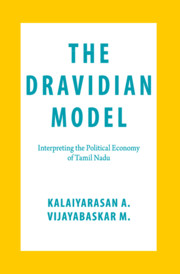Book contents
- Frontmatter
- Dedication
- Contents
- List of Tables
- List of Figures
- List of Abbreviations
- Acknowledgements
- 1 The Dravidian Model: An Introduction
- 2 Conceptualising Power in Caste Society
- 3 Democratising Education
- 4 Democratising Care
- 5 Broadening Growth and Democratising Capital
- 6 Transforming Rural Relations
- 7 Popular Interventions and Urban Labour
- 8 Fissures, Limits and Possible Futures
- Bibliography
- Index
6 - Transforming Rural Relations
Published online by Cambridge University Press: 08 July 2021
- Frontmatter
- Dedication
- Contents
- List of Tables
- List of Figures
- List of Abbreviations
- Acknowledgements
- 1 The Dravidian Model: An Introduction
- 2 Conceptualising Power in Caste Society
- 3 Democratising Education
- 4 Democratising Care
- 5 Broadening Growth and Democratising Capital
- 6 Transforming Rural Relations
- 7 Popular Interventions and Urban Labour
- 8 Fissures, Limits and Possible Futures
- Bibliography
- Index
Summary
Many scholars have suggested that identity-based mobilisation in the state has ignored class- based issues such as land reform or empowering of labour (Mencher 1975; Thangaraj 1995; Subramanian 1999). In this and the next chapter, we argue for a more nuanced understanding of how the subnational state has negotiated the question of labour welfare even as it sustained capital accumulation. In this chapter, we focus primarily on how mobilisation and policy interventions have improved the terms of work, incomes and status of rural labour including small holders and tenant farmers. As we argued in Chapter 2, ensuring inclusive structural transformation was critical to the Dravidian vision of social justice. Translated into developmental challenges, this implies two sets of processes. First, interventions ought to ensure shifts of people out of agriculture and other traditional occupations into secure livelihoods in the non-agricultural sector to undermine caste hierarchies. Second, while this involves shifts over time, interventions should also secure place-based livelihoods and income security at a given point in time.
We map three policy interventions that have made this possible. First, though land reforms were not pushed through strongly by legislation at one stroke, land transfers from upper-caste landlords to lower-caste tenant farmers did take place through molecular interventions and pressure from collective mobilisation. Second, investments in physical and social infrastructures have enabled diversification of rural livelihoods away from agriculture. Such diversification, accompanied by investments in education, in turn has led to better bargaining power for labouring households within agriculture. Third, an important argument that both this chapter and the next make is that substantial interventions in the labour market have been indirect through economic popular and social popular measures outside the domain of the workplace. Rural welfare interventions primarily through the public distribution system (PDS) and caste mobilisation sought to undermine hierarchical labour relations between the landed and the landless. Availability of food through the PDS weakened the basis of labour control and opened up economic possibilities for labouring households outside the domain of agriculture and the rural milieu. Such mediations outside the workplace have not only transformed rural social relations, but have also helped poorer households diversify into the non-farm sector on relatively better terms.
- Type
- Chapter
- Information
- The Dravidian ModelInterpreting the Political Economy of Tamil Nadu, pp. 144 - 172Publisher: Cambridge University PressPrint publication year: 2021



